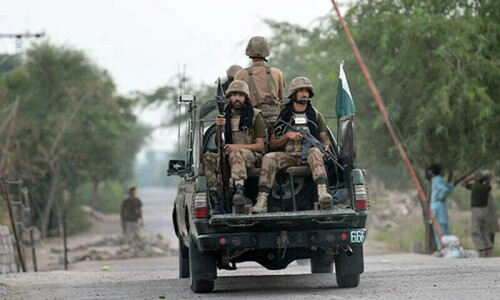ISLAMABAD: The government plans to introduce a mechanism for charging all types of water use to ensure through an act of parliament recovery of the cost of repair and maintenance of water infrastructure.
This is one of several initiatives the government plans to take under a National Water Policy to be announced by the prime minister. The policy will focus on transferring the responsibility for command area development to farmers because of government’s financial constraints. But, according to official sources, the drinking water sector will be protected as a fundamental right of citizens.
Know more: 8 bottled water brands found to be ‘unsafe for consumption’
“The delivery services of water for all its uses will be made economically and financially sustainable and social and economic value of water will be emphasised,” says a policy document recently shared with relevant sectors.
Increase in water charges and curbs on human settlements along river banks envisaged
It says that water will be ‘realistically’ charged at the delivery point under the ‘general principle’ that full cost recovery should be ensured from all production sectors; concept of affordability should be applied to social uses and free water supply should be ensured for environmental and ecological needs.
“Wherever subsidy becomes inevitable it will be carefully estimated and the sources of its financing will be clearly indicated,” the policy paper says, adding that even the sources of subsidy would be such that have adequate financing resources.
For the first time, the policy-makers have recognised that fresh water is a finite resource which cannot meet unlimited demand of numerous users and that increasing population is a key factor for the increase in water demand.
Therefore, the proposed policy also lays stress on demand management through population growth control on measurable targets.
The policy-makers have acknowledged that water is a highly under-priced commodity and the prevailing cost recovery through water cess (Abiana) is hardly able to meet around 30 per cent of the operation and maintenance cost of the irrigation infrastructure. Therefore, measures will be taken to enhance water charges to meet the cost and ensure long-term sustainability.
The concept of “More Crop Per Drop” will be pursued to ensure food security through a national plan to improve irrigation methods and practices and introduce new varieties of crops of high yields and lower water consumption, resistant to heat stress and drought tolerant and less prone to insects and pests.
The concept of participatory management of irrigation system will be promoted and monitored with respect to its outcome with the help of farmers’ organisations to enable the irrigation stakeholders to effectively participate in decision-making.
At the same time, ground water table will be managed so that it does not impede crop growth or cause land salinity or underground saltwater intrusion.
An effective mechanism will be introduced at provincial level to ensure equity of water distribution between head and tail reaches and water allocations for various canals will be rationalised.
The policy promises plans and initiatives to progressively provide access to clean and safe drinking water and sanitation facilities to the entire urban and rural population.
It says that full financial sustainability will be ensured for urban water supply and sanitation systems “through effective reduction in wastages, theft and non-revenue water and 100pc metering”. However, effective safety-nets will be provided to poor communities.
The rural water supply and sanitation services will be charged at affordable rates and it will be mandatory for relevant agencies that under no circumstances the quality of drinking water, urban or rural, should fall below the specified standards.
The policy paper says that a plan for flood zoning will be implemented to prevent losses to people living along river banks. For this, a river act will be introduced in parliament to restrict or prohibit permanent settlements in high and medium flood risk areas on the basis of zoning and mapping of the River Indus and its tributaries — Jhelum, Chenab, Ravi, Sutlej, Kabul and Swat.
The sources of surface and underground water will be diligently protected from contamination and maintained in a healthy state.
Development of hydropower will be treated as a high priority objective. Water projects with power generation potential will be given preference over those without such a potential.
A measure of highest consideration for the ranking of hydel projects will be the cost from the source as transmitted to and received at the national power grid system by securing funds from international development institutions and participation of private sector.
Moreover, the development of low-head hydropower projects on canals will be encouraged for distribution by power companies at local level.
To ensure that the policy is implemented without disputes and resistance, a national water commission, headed by federal minister for water and power and comprising minister for planning and climate change and provincial irrigation ministers, will be set up so that existing water accords, shares and entitlements are protected during future planning, development and infrastructure upgradation.
Published in Dawn, December 7th, 2015











































